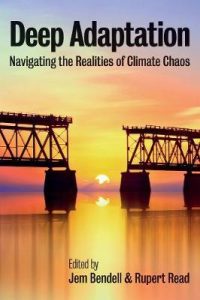By Lee Van Ham
Depressing or inspiring? Though I feared getting depressed, I recently agreed to watch the documentary, “Living in the Time of Dying” (YouTube). But I was greatly surprised! I felt inspired. My convictions about how I wanted to live grew stronger.
It’s a 54 minute documentary produced by Australian Michael Shaw featuring Catherine Ingram, Dahr Jamail, Jem Bendell, and Stan Rushworth (Indigenous). They consider it a misleading illusion to tell a story of how climate change will soon be reversed, that soils and oceans are undergoing regeneration, or that sea level rise won’t submerge coastal homes and cities. The scale of change we need is simply not happening…yet. Rather, they believe that when we know the truth, even if it feels dark, it will help us respond with energy and creativity. Falsehoods foster distrust. Anxiety. Depression. Jem Bendell believes we are capable of deep adaptation, meaning, surface adaptations never take away the gnawing at our souls. Shallow actions don’t satisfy our souls. As we continue efforts to get powers outside ourselves to act, we can get really depressed. Any promises that technology and policies will take of Earth’s stupendous changes deserve skepticism.
Rushworth (Indigenous). They consider it a misleading illusion to tell a story of how climate change will soon be reversed, that soils and oceans are undergoing regeneration, or that sea level rise won’t submerge coastal homes and cities. The scale of change we need is simply not happening…yet. Rather, they believe that when we know the truth, even if it feels dark, it will help us respond with energy and creativity. Falsehoods foster distrust. Anxiety. Depression. Jem Bendell believes we are capable of deep adaptation, meaning, surface adaptations never take away the gnawing at our souls. Shallow actions don’t satisfy our souls. As we continue efforts to get powers outside ourselves to act, we can get really depressed. Any promises that technology and policies will take of Earth’s stupendous changes deserve skepticism.
It can be encouraging to hear that, because the current collapses are brought on by human choices, we are also the ones to bring change through radically different choices. We make such choices knowing that the deadlines to prevent many parts of collapse have passed. They’ll unfold no matter what we do. But good choices can still opt loudly for life. Earth continues to be our ally—if we will cooperate with her. Scientists are repeatedly amazed by Earth’s forces to regenerate life. But we need to relinquish unrealistic notions that redesigning Earth technologically is the way into a livable future.
A majority of youth today know we have messed up. Worse, they don’t believe we are finding the ways to recognize the collapse. This fills them with great anxiety and anger. They see the obvious and can’t believe how inactive we elders are in the face of it. Do we really care about them? With whom can they talk about the truth as they see it, and their frustration with our inaction? They have great confidence that with honest answers, they know they can create a better world. They want us to get our illusions—out of their way.
The way of Deep Adaptation fits them. Their intuitions and grief about their future do not need to be washed over with hopes that cannot be realized. Rather, they can find honest paths for living that don’t deny anything, but continually adapt to new truths being revealed.
Deep Adaptation provides four Rs to guide us: Restore what’s life-giving, Relinquish what isn’t, live with Resilience, and Reconcile with change. In “Deep Times: A Journal of the Work That Reconnects,” a fifth R, Reverence is suggested in an article (https://journal.workthatreconnects.org/2021/09/20/r-is-for-reverence/) by eco-minister Lauren Van Ham. The OneEarth Jubilee Covenant (https://oneearthjubilee.com/invitation-to-sign-the-oneearth-jubilee-covenant-for-2022-and-beyond/) needs to be understood and practiced as what we do in a time of dying. It is not about reversing what is already too far into the systems of the planet to be reversed. But, truthfully, not everything has gone that far. Collapse isn’t total, but partial collapses are well underway. How do we then live?





